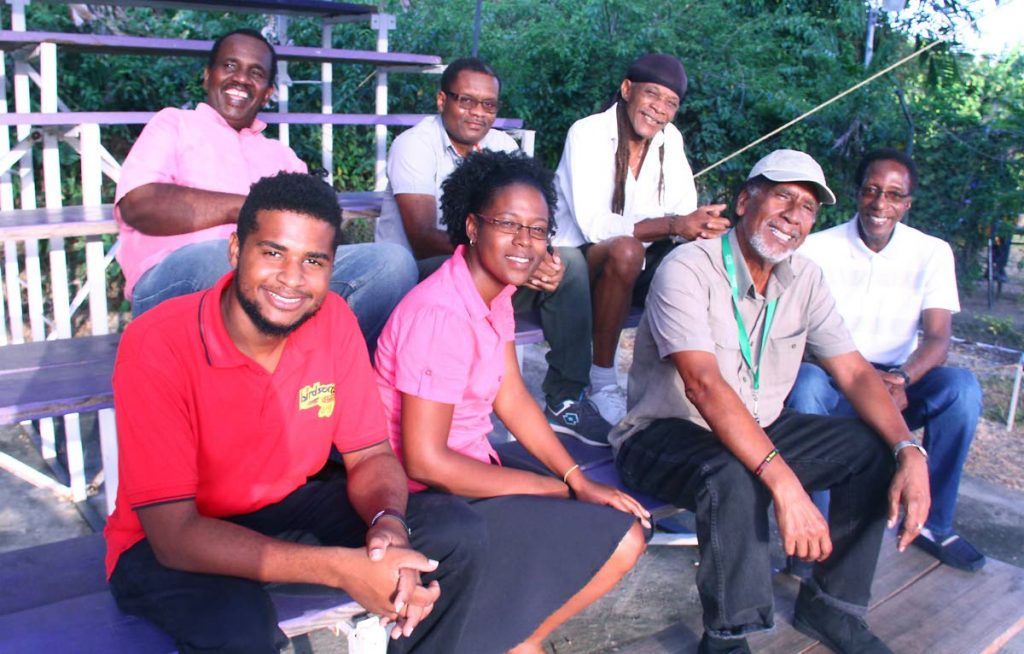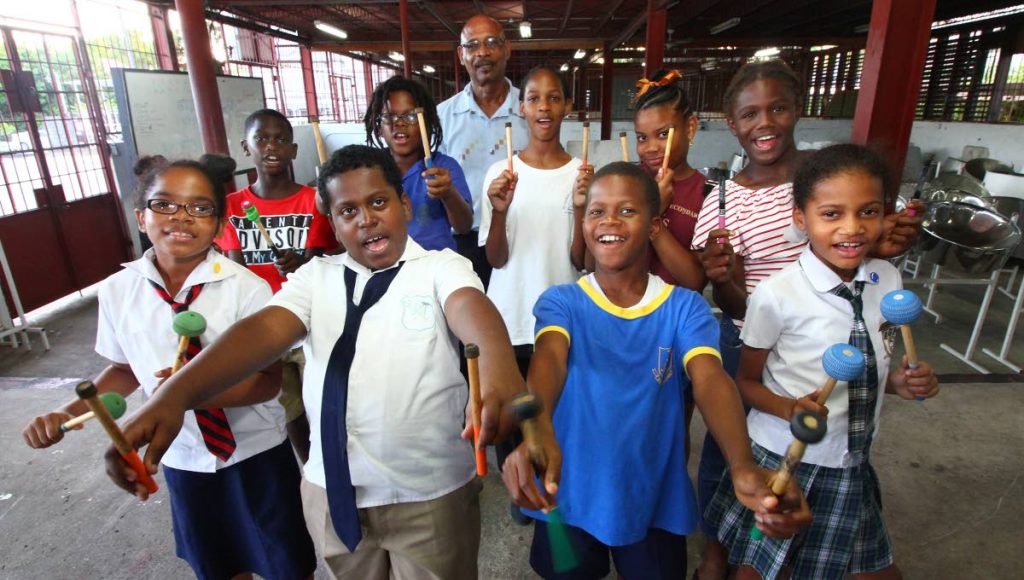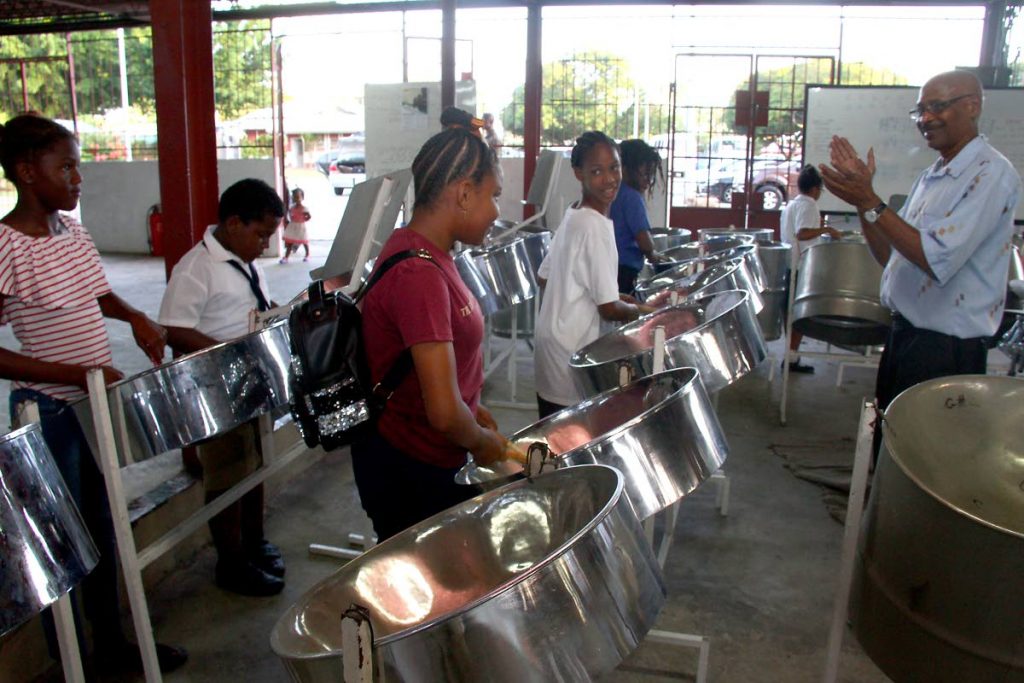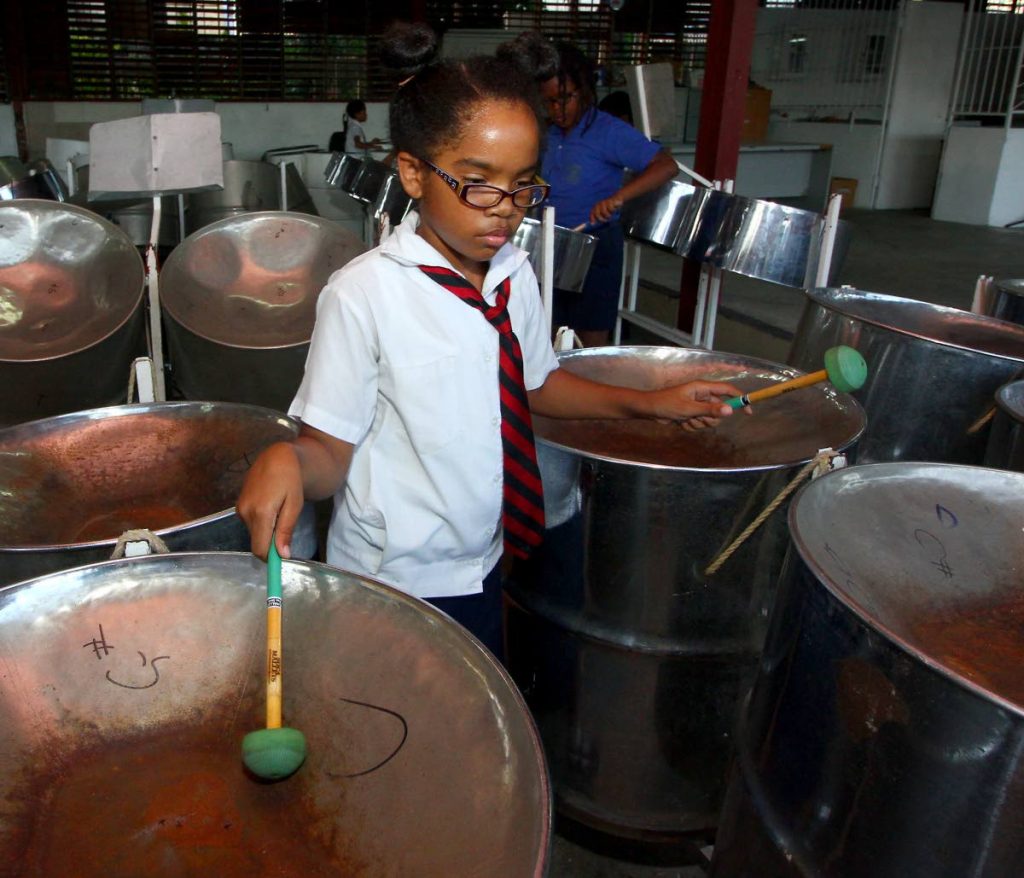Birdsong’s music power

C-AEOLIAN stood out on the board. Phrygian Dominant and C-Dominant pentatonic scales are phrases that might be unfamiliar to everyday people but to the students of the Birdsong academy that is everyday language.
In the corner of the dimly-lit, air-conditioned room, the keyboards and music stands stood as if eagerly awaiting their players.
The academy will be hosting its annual vacation camp, which gives children the chance to learn music on a variety of instruments including pan. Auditions for the camp were held on May 30 and 31. But the camp will be held from July 9 to August 16 at its Old Works Department, Agostini Street, St Augustine location. It hosts children from ten to 18 years.
The camp will end with a concert on August 16 at Queen’s Hall, St Ann’s. Birdsong’s academy consists of its orchestra, the ensemble and pan. There was immense pride on Richard Quarless’ face and in his voice as he spoke of the students’ results from the Associated Board of the Royal Schools of Music (ABRSM) exams.
He beamed as he said, “We have distinctions and merits. No failure in it. And I have some children here who just started playing for the last year or so.”
Quarless who has been a musician for over 35 years is now the academy’s musical director. The academy’s programmes holds true to Birdsong’s ethos.
“The band’s ethos is aimed at promoting music and social development,” its website says.
At the academy it is not only about teaching music, he said, but educating them “otherwise.”

The programme began 15 years ago (2004) and Quarless has been there since its start. He has seen it grow and develop from having only 50 students learning only pan to having 100 students, sometimes more, learning conventional instruments like saxophone, guitar, keyboard, clarinet and the trumpet.
Programmes like these are done at no cost to the students and their parents. “The people who we target are people who don’t have money. They can’t afford to go and do music outside. There are people who can pay for their children to go and do it. But there are those who can’t get it and this is what Birdsong is doing,” he said. The academy runs an after-school programme, an ensemble and the pan side. On Tuesdays, the after-school programme teaches the primary school students and on Wednesdays it’s secondary school students’ time.
Quarless recalled when the programme started he had to “beg” for instruments. Through his “begging” he was able to secure the conventional instruments needed to expand the programme, but after 15 years some of the instruments don’t work properly because of “wear and tear.”
“We did not have many instruments to do brass at the time but as time went on we beg, which I do, because I am good at that. We beg and beg and we got instruments. We got some help from Nation Gas Company (NGC). But, right now, we need plenty instruments right now. After 15 years of using those instruments, wear and tear. Right now I am in need of two tenor saxophones,” he said.

For him, Birdsong’s role, by having these programmes is to “spread it across the country and to produce good musicians.”
He defines a “good musician” as someone “who knows both theory and practical” and “has the passion for the music to take it forward.”
Many people, he said, played music by ear “and you bring a chart for them they can’t play it.”
“Not here. Inside here you will be amazed to see what these children here can do,” he added.
That is where Quarless’ joy comes from, seeing the academy’s students go on to pursue tertiary level studies at both the University of Trinidad and Tobago (UTT) and The University of the West Indies (UWI).
But not only has the academy produced musicians but also doctors, lawyers and other professionals.
He believes that if such an academy and programmes existed at other panyards throughout TT there would be little room for crime.
“All those pan sides should be doing this. If we do this, then there is no crime. Instead of them taking up guns and knives, they would take up instruments in their hands.”

Those chosen for the camp do not only come from Birdsong’s after-school programme but also from those who respond to an advertisement.
“We ask who have that passion for music. We do an ad and when they come, we display all of the instruments on a table and I ask ‘what instrument do you want to play.’ I then ask them to demonstrate the instrument whether it is the saxophone or trumpet. I don’t go by what the parent says.
“We have people from the Wednesday programme and after-school programme, we cater for about 100. When we check up what we have for the after-school, primary and secondary school, the balance that is needed is what we take (from the auditions).”
Birdsong which began in 1973 is rather an organisation with three arms –the steel orchestra, the musical academy and a social enterprise organisation.
So, it was little surprise when Quarless said, “We are not about Panorama and stuff. We are about teaching those children. It is about educating the children musically and otherwise.”
The efforts have created many musical notables including its now tutor Darrianne Dyett. She, like Quarless, came to the academy when it started.
During her time it was introduced through the school system and “was a free programme. It was a good opportunity because at that time many people could not afford to do music. I decided I could try that and I have not regretted it.”
Through Birdsong she got a scholarship and pursued her bachelor’s and master’s in Europe. She did her bachelor’s at Prince Claus Conservatoire, Netherlands, and her master’s at Codarts, Rotterdam. Dyett specialises in pan jazz.
“I came straight up from here. In working hard and doing well over the years. They encouraged me to study abroad. There were people like Raf Roberston (now deceased) who really encouraged me and I had the opportunity to work with him when he came here. He saw the potential in the programme and came here to work with us.”
She said music literacy is not part of the whole pan movement and that is what makes Birdsong’s programme “so special.”
“That was the purpose of the programme to literate pan players because there seems to be such a big gap between musicians and pan players in Trinidad,” she said.
Birdsong, she added, has been trying to close the gap between musicianship and “panmanship”.
At this year’s camp Dyett said, “We are trying to make this camp a little more project-based.”
“In a class like arranging and we do more than teach them how to arrange. We have some students who have been here for a couple of years so we would like to expand that by having an open mic. We try to get them more involved in actually trying to get their arrangements out on the open mic stage,” she said.
While the programme promises to be “quite intense from Mondays to Fridays 8 am-4 pm” the students will also be going on field trips.
Dyett knows the value of music but more so Birdsong’s music. “There was so much I was able to achieve through music. I really believe in the power of music...,” she added.


Comments
"Birdsong’s music power"